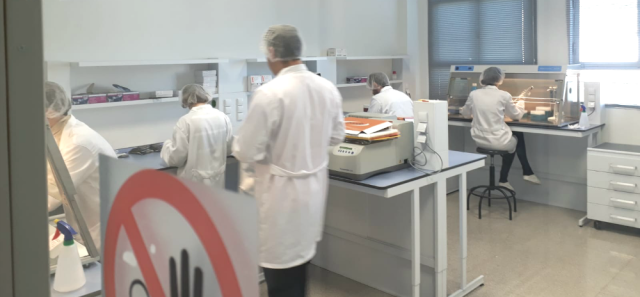This website uses cookies so that we can provide you with the best user experience possible. Cookie information is stored in your browser and performs functions such as recognising you when you return to our website and helping our team to understand which sections of the website you find most interesting and useful.
R&D Projects





InstaTest Project: Fully and automated oral swabbing with GPS™ MONODOSE qPCR technology
As the COVID-19 pandemic demonstrated, failure to scale-up surveillance capacity for highly infectious diseases will result in detrimental global health problems. The project, acronymed InstaTest, aims to develop and validate an innovative sampling robot for efficient fully automated oral swabbing integrated with MONODOSE qPCR technology. Genetic PCR solutions S.L., together with partners from different European countries, is participating in this project which has been funded by the Eurostars-3 programme with co-financing from the CDTI and the Horizon Europe Research and Innovation of the European Union.
The robot, combined with the MONODOSE qPCR technology, will provide a highly specific and rapid test for the identification of multiple pathogens in relevant settings such as hospitals, public transport or multitudinary events.

NOSOCOMIAL INFECTION RISK MONITORING
genetic PCR solutions™, registered trademark of the company Genetic Analysis Strategies S.L., is leading the project The Environmental Clinical Bio-safety System project: Nosocomial Infection Risk Monitoring, with the acronym NOSOBIOSAFE, wich intends to carry out planned research and critical studies aimed at developing and implementing a new system for rapid monitoring of microbial load, detection of nosocomial pathogens and their genetic profile of virulence and resistance to antibiotics in the air of hospital risk areas. In addition, this system will make it possible to predict outbreaks of new pathogens, even if they have not been previously described.
This research project is perfectly aligned with the challenges of the Strategic Innovation Committee (CEI) proposed in 2022, since the main objective is the prevention of infections caused by nosocomial pathogens and the development of early detection systems for colonizing microorganisms.
The NOSOBIOSAFE project has received a public grant for financial support from the Valencian Innovation Agency (AVI) within the Consolidation of the business value chain program (File No.: INNCAD/2022/23).

NEW DIAGNOSTIC KITS FOR THE HEAD AND NECK EPIDERMOID CANCER BASED ON THE COMPOSITION ANALYSIS OF THE SALIVARY MICROBIOTA
GPS™ has developed multiple assays for saliva microbiome characterization from patients with epidermoid carcinoma of the head and neck. The project, with the acronym OncOralTest, aims to develop a diagnostic tool based on biomarkers to improve the early diagnosis and treatment. The cooperation between BIOTHAS, S.L. and genetic PCR solutions, S.L. to achieve the project, enhances the results of the research and development of a new diagnostic product for the oncology sector. The project is granted by the Instituto Valenciano de Competitividad Empresarial (IVACE) IMIDCA/2021/38.
Identification of lineages of SARS-CoV-2 are difficult from single mutations and the most relevant issue is the lack of specificity.
GPS™ has developed an assay for characterization of 20 mutations within a 921 bp fragment which can lead to the identification of the most relevant lineages of SARS-CoV-2. Through the amplification, purification, and sequencing of this fragment of the S gene, an unknown sample can be assigned to one of these lineages with the use of a reference phylogenetic tree. The SARS-CoV-2 seq-RT-epPCR comprises a series of specific targeted reagents to obtain a preparative PCR for sequencing and posterior identification of different lineages of SARS-CoV-2. IMIDTA/2021/75


Red de Investigación de Sanidad Animal (RISA)
genetic PCR solutions™ become a member of RISA. This Network, which brings together numerous researchers dedicated to Animal Health in Spain, is created with the intention of enhancing the existing synergies between the different Spanish animal health research groups, with experts in disciplines as varied as entomology, epidemiology and animal welfare, among others, all complementary, to achieve a more rational, responsible and optimized use of resources, ensure animal health and welfare and therefore, public health.
ARREST-TB: Accurate, rapid, robust and economic diagnostic technologies for tuberculosis
The Spanish technology-based company Genetic Analysis Strategies SL, through its GPS™ brand, participates in the European project “ARREST-TB: Accurate, rapid, robust and economic diagnostic technologies for tuberculosis“. The project brings together a consortium of academics from the University of Edinburgh, the Heriot Watt University, the University of Padua, together with the companies DestiNA Genómica and Optoi. The development of new technologies for the diagnosis of tuberculosis is projected to be evaluated in countries with a high prevalence for this infection, in close collaboration with the Central Institute of Tuberculosis Research, (Moscow, Russia), the National Institute for Tuberculosis Research (Chennai, India) and ShanMukha Innovations Pvt. Ltd.
Tuberculosis, a disease caused by bacteria of the species Mycobacterium tuberculosis, is a global threat to public health responsible of 1.3 million lives in 2016 and being the ninth leading cause of mortality in the world. The World Health Organization (WHO) has designed a route plan to follow with the aim of motivating collaborations that lead to the development of new diagnostic methods, allowing an improvement in the monitoring of patients. Tuberculosis, moreover, is not left out of the global growth of resistance to multiple antibiotics that has been detected in many pathogens. The rapid spread of these resistances is compromising the efficacy of antibiotics, including those of last resort. According to Dr Antonio Martinez-Murcia, professor at the Miguel Hernández University and director of GPS™, “as a result, drug resistance is considered to be the most accurate and imminent threat to the population”.

The objective of the ARREST-TB project is the development of molecular probes and optical devices that enable effective action in the rapid diagnosis of Mycobacterium tuberculosis as well as the presence of its resistance to antibiotics. The development of trials that allow monitoring patients under treatment against tuberculosis and determine its evolution will be addressed.
The objective of this project, with the acronym “ONE-DAY FOOD TESTING”, is the achievement and validation of a prototype system capable of ensuring the detection of pathogenic microorganisms in high-risk foods with maximum precision and sensitivity, reducing the time of analysis so that it can be executed in a working day (approximately 8 hours) and ensure the delivery of IV and V range products with all the health guarantees. IMIDTA/2017/53


genetic PCR solutions™ is a partner of The AQUAVALENS consortium. AQUAVALENS has brought together SMEs, Industries, Universities and Research Institutes with the mission of protecting the health of European Citizens from contaminated drinking water and water used in food processing. We will achieve this by developing sustainable technologies to enable water system managers whether in large or small water systems or within food growers or manufacturers to better control the safety of their water supplies. The GPS™ developed kits, have been spread among AQUAVALENS partners to be used as a reference method during process development and ring-test validation. 2013-2018
